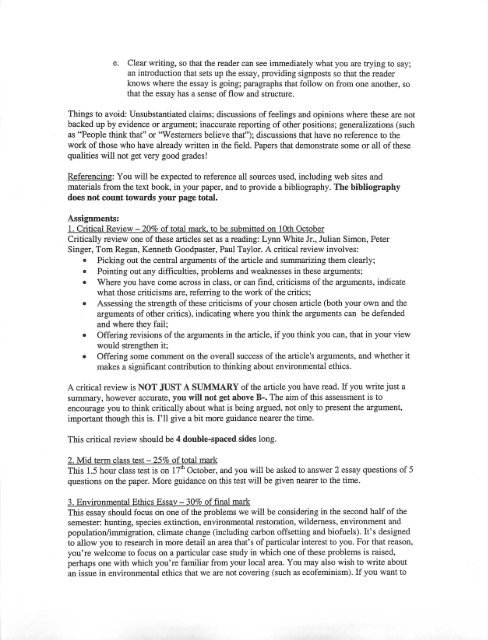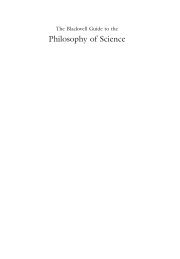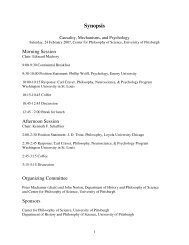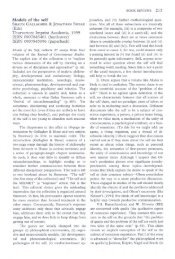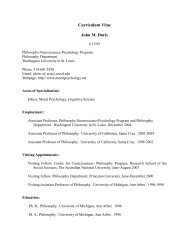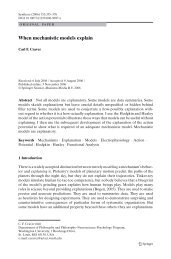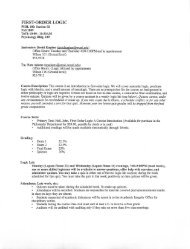CLASS SYLLABUS: INTRODUCTION TO ENVIRONMENTAL ...
CLASS SYLLABUS: INTRODUCTION TO ENVIRONMENTAL ...
CLASS SYLLABUS: INTRODUCTION TO ENVIRONMENTAL ...
You also want an ePaper? Increase the reach of your titles
YUMPU automatically turns print PDFs into web optimized ePapers that Google loves.
e. Clear writing, so that the reader can see immediately what you are trying to say;<br />
an introduction that sets up the essay, providing signposts so that the reader<br />
knows where the essay is going; paragraphs that follow on from one another, so<br />
that the essay has a sense of flow and structure.<br />
Things to avoid: Unsubstantiated claims; discussions of feelings and opinions where these are not<br />
backed up by evidence or argument; inaccurate reporting of other positions; generalizations (such<br />
as "People think that" or "Westerners believe that"); discussions that have no reference to the<br />
work of those who have already written in the field. Papers that demonstrate some or all of these<br />
qualities will not get very good grades!<br />
Referencing: You will be expected to reference all sources used, including web sites and<br />
materials from the text book, in your paper, and to provide a bibliography. The bibliography<br />
does not count towards your page total.<br />
Assignments:<br />
1. Critical Review - 20% of total mark, to be submitted on 10th October<br />
Critically review one of these articles set as a reading: Lynn White Jr., Julian Simon, Peter<br />
Singer, Tom Regan, Kenneth Goodpaster, Paul Taylor. A critical review involves:<br />
• Picking out the central arguments of the article and summarizing them clearly;<br />
• Pointing out any difficulties, problems and weaknesses in these arguments;<br />
• Where you have come across in class, or can find, criticisms of the arguments, indicate<br />
what those criticisms are, referring to the work of the critics;<br />
• Assessing the strength of these criticisms of your chosen article (both your own and the<br />
arguments of other critics), indicating where you think the arguments can be defended<br />
and where they fail;<br />
• Offering revisions of the arguments in the article, if you think you can, that in your view<br />
would strengthen it;<br />
• Offering some comment on the overall success of the article's arguments, and whether it<br />
makes a significant contribution to thinking about environmental ethics.<br />
A critical review is NOT JUST A SUMMARY of the article you have read. If you write just a<br />
summary, however accurate, you will not get above B-. The aim of this assessment is to<br />
encourage you to think critically about what is being argued, not only to present the argument,<br />
important though this is. I'll give a bit more guidance nearer the time.<br />
This critical review should be 4 double-spaced sides long.<br />
2. Mid term class test - 25% of total mark<br />
This 1.5 hour class test is on 17 October, and you will be asked to answer 2 essay questions of 5<br />
questions on the paper. More guidance on this test will be given nearer to the time.<br />
3. Environmental Ethics Essay - 30% of final mark<br />
This essay should focus on one of the problems we will be considering in the second half of the<br />
semester: hunting, species extinction, environmental restoration, wilderness, environment and<br />
population/immigration, climate change (including carbon offsetting and biofuels). It's designed<br />
to allow you to research in more detail an area that's of particular interest to you. For that reason,<br />
you're welcome to focus on a particular case study in which one of these problems is raised,<br />
perhaps one with which you're familiar from your local area. You may also wish to write about<br />
an issue in environmental ethics that we are not covering (such as ecofeminism). If you want to


